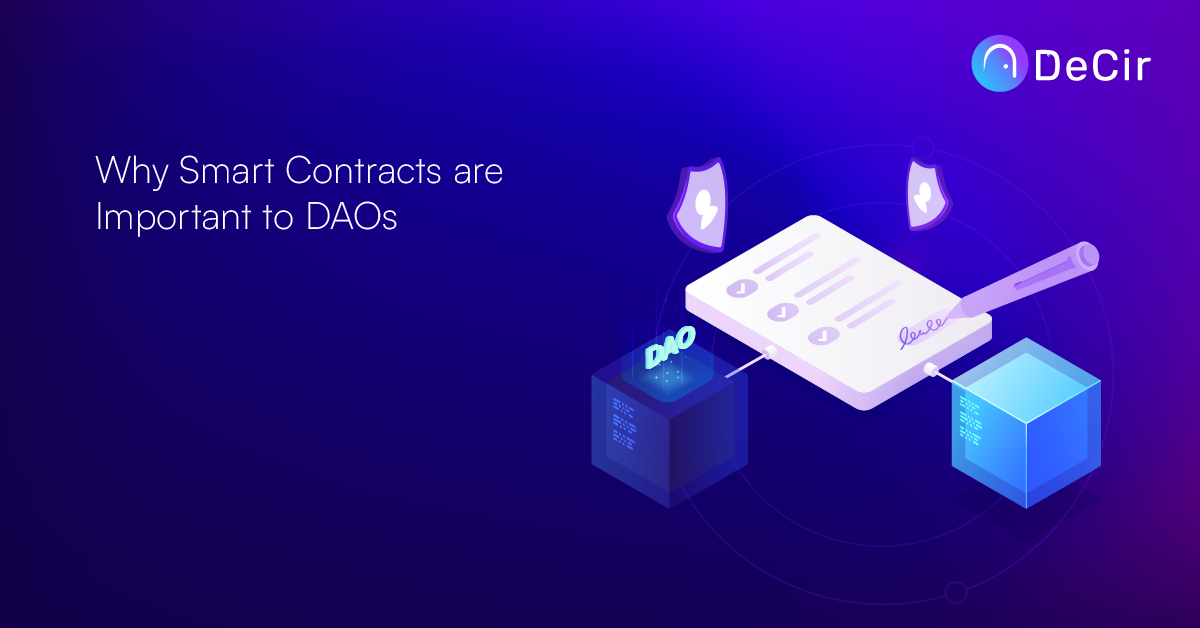Decentralized autonomous organizations or DAOs are conceived to be the future of organizations around the world. This is because DAO introduces a structure where all members are equal. DAOs encourage decentralized decision-making. Notwithstanding, this decentralized approach to organizational management is enabled by smart contracts. In this article, we explain the top three reasons DAOs need smart contracts.
TL;DR
- The entire structure of a DAO hinges on automated rule enforcement which is powered by smart contracts
- Smart contracts enable members of a DAO to make proposals and vote on existing proposals
- Smart contracts serve as the bedrock upon which a fully decentralized autonomous organization can exist.
Creating and Enforcing DAO Regulations
The idea of a fully functional decentralized organization is one that exists on the basis that no single individual or group of individuals has absolute power over decision-making. This goes against the norms of organizations and structure. In the traditional organizational system, hierarchies and strata exist to create a structure of power and decision-making.
Smart contracts enable decentralized organizations to deviate from the norm of traditional organizations. Smart contracts exist as rules and regulations that have been built as codes and programmed into the underlying infrastructure upon which a DAO functions.
Smart contracts function as autonomous systems that must be triggered for certain events to take place. For example, a DAO smart contract might indicate that two-thirds of community members must agree to a proposition before such a proposition goes into effect. This set rule is automatically enforced by the DAOs smart contract. Thus, a proposal will only become enforceable when the stated number of people agree to it.
Smart contracts ensure that DAOs cannot be manipulated or used as a tool to hoodwink community members. DAOs ensure that all community members regardless of their location in the world, have a say in how things work in the organization. They are bound by the same rule and no group has the final say on the outcome of the decision-making.
Also read: What are Decentralized Autonomous Organizations?
DAO Proposals and Voting Systems
It is no hidden fact that DAOs have no central authority, yet decision-making is done in a coordinated manner. Smart contracts are critical to ensuring a smooth decision phase for DAOs. This is done through proposals and voting systems.
Oftentimes, decentralization in DAO comes from the ability of each and every member to fully make contributions. As such, community members make changes through proposals. A proposal is an official bid by a community member, stating their ideas and giving reasons tangible reasons they think it will benefit the entire community.
For a new idea to come to life, it must be presented in the form of a proposal. Members are then allowed to vote on such proposals to determine if they are generally acceptable to the community.
This is where smart contracts come in. Smart contracts are used to implement such proposals after they have been voted upon by the community. If the proposal meets the specified requirements, they are automatically enforced by smart contracts.
You might like: Benefits of DeCir’s royalty splitter tool for DAOs
The Bedrock of Decentralized Communities
It is quite easy to say that smart contracts are the bedrock of decentralized communities. They ensure that decentralized organizations maintain their decentralized status.
Oftentimes, DAOs have members spread across different countries. These groups of people usually have a shared purpose and common interest that they seek to pursue. DAOs are formed around courses such as charity, investment, art, and education, among others. Smart contracts ensure that each member has a say in how the organization achieves these goals.
Smart contracts ensure collective ownership and create a sense of belonging which is often lacking in traditional organizations. It creates an atmosphere where every member knows that their opinions are not sidelined, thus, encouraging increased participation.
Conclusion
The decentralized nature of DAOs makes smart contracts central to how they function. From maintaining their decentralized structure to managing processes and implementing goals, smart contracts will continue to be central to the existence of decentralized autonomous organizations.


